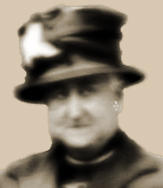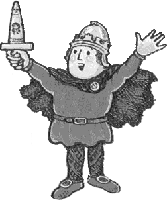Mrs M's theory of human behaviour
It has, of course, been an eventful week for her ladyship's editor who has been much taken up not only with the awards ceremony but also with the work she is doing for the Ouch! weblog. (Lady Bracknell has granted permission for the editor to use her employer's name as a nom de web for this purpose, as she is in agreement that it would be unwise for the editor to reveal her true identity in so public a forum.)
Added to that, Lady Bracknell reluctantly attended her doctor's surgery for her annual "flu jab" on Friday morning, and has spent most of the intervening period shivering under extra bed clothes in her boudoir as a direct result. Of all the annual indignities to which Lady Bracknell is exposed in connection with her diabetes, this one is the worst, if only because its effects are the most long-lasting. The diabetic retinopathy screening runs it a very close second, however. And if the chiropodist whom her ladyship sees once a year feels constrained to point out to her yet again this year that her feet have to carry a lot of weight, Lady Bracknell fears that she may temporarily lose control of whichever of her handsome walking sticks she happens to have with her at the time.
However, none of this is to the point. (Lady Bracknell much admires concision in others, but has never managed to achieve it herself.)
More years ago than she cares to remember, Lady Bracknell had the great good fortune to work with a most charming and insightful lady, one Mrs M. Apart from the sporadic exchange of Christmas cards, the two ladies are now barely in touch, distance having proved a considerable obstacle to the continuation of the friendship prior to the advent of instantaneous electronic methods of communication.
Be that as it may, Lady Bracknell often has cause to recall certain words of wisdom which fell from Mrs M's lips as the two ladies were taking the air in Northampton. Mrs M had developed her own theory of human behaviour, which was:
"Everyone is either a child, or an adult."
Readers may have jumped to the immediate (if erroneous) conclusion that this theory can hardly be said to contain any original thought, given that it is the natural way of things for human beings to begin life as infants, and subsequently to pass through childhood on to adult estate. But what marks Mrs M's theory out from being a simple statement of irrefutable fact is that it is intended to be applied regardless of chronological age.
In other words, a child of ten years can comport itself with such maturity as to be dubbed an 'adult', and a septuagenarian can behave with such an utter want of consideration for the the effect that his or her behaviour might have on others as to be, without doubt, a 'child'.
Tremendous amusement can be had from the simple mental exercise of dividing all one's acquaintances into 'children' and 'adults'. In case any of her readers are still metaphorically at sea, Lady Bracknell will elucidate further by listing a few of the typical behaviours for each category.
The child
- is the centre of his or her own universe
- responds to criticism by being defensive
- never admits to being at fault
- behaves petulantly when not the centre of attention
- throws tantrums to get what he or she wants (the modern vernacular expression is, Lady Bracknell believes, "spits the dummy")
- will not willingly share his or her "toys"
- manipulates other people shamelessly to achieve his or her own ends
- adopts a wheedling tone to get his or her own way
- believes the world owes him or her a living, and that he or she has an absolute right to take up paid employment only if it will be fulfilling and enjoyable
- refuses to take responsibility for his or her own actions.
The adult
- considers the ramifications of his or her own actions, and takes responsibility for them
- is capable of engaging in rational debate without becoming emotionally involved
- considers other people's feelings
- refuses to stoop to whining to get his or her own way
- can see both sides of an argument
- accepts that life is not fair, but makes the best of his or her own circumstances
- extends equal courtesy to all, regardless of their relative positions
- does not take credit for others' work or ideas
- protects those who cannot, for whatever reason, protect themselves
- accepts the need to put bread on the table, and does not expect that his or her working life will necessarily be one long round of enjoyment.
Lady Bracknell trusts that the distinction is now clear, and that her readers will enjoy applying Mrs M's theory to whomever they should encounter in future.
Although persons of mature years ought, wherever possible, to avoid behaving childishly (if for no other reason than because such behaviour will ultimately render them friendless), that is not to say that we should set aside all the pleasures of our childhoods. Lady Bracknell's younger brother has posted her a DVD of Noggin the Nog, which is not only giving her ladyship great pleasure, but is confirming her belief that children's television programmes are not what they used to be.












5 Comments:
Greetings Lady B'
Have you read a tome by the late Eric Berne called Games People Play? Transactional analysis is what it is about.
Here's a site with some more info:
http://www.businessballs.com/transact.htm
best wishes
peter pan
ps loved your blog!
What a wonderful post, m'lady.
Might I add, there seems to be more than a passing resemblance between your good self and the wonderful Noggin the Nog. I suspect Noggin's sword might be green, too, when in colour.
Oooohhhh fun!! I have recently encountered a particular human whom I would undoubtedly classify as a child, according to Mrs M's system.
It makes my day MUCH brighter to refer to him accordingly! Hehe!
There are also 'parents'...The people who take away other's choices and control...They basically bring out the child in others (as those children will bring out the parent in others) resulting in a nasty game...It's all in Eric Berne's book, as Peter Pan says. (Love that username, Peter!!)
I found the adult/child classification very interesting and certainly descibed behaviour of some so called "adults' I have come across. However one point I'd take some issue with is that the Child "believes the world owes him or her a living, and that he or she has an absolute right to take up paid employment only if it will be fulfilling and enjoyable". Rather, I would align myself with the much lamented Utopian Socialist, William Morris who believdd that the problem lay in separating "work" from "leisure" in the first place. All work, according to Morris should be pleasurable, thus removing the need for unproductive self-expression via leisure. Such change would also mean an end to what he called useless toil- overproduction of trash for a wasteful market economy . After all who is to say that taking my grandchildren to the park is a less valuable activity than - oh, say producing a "reality" TV show. One is unaid (and enjoyable) ..the other is paid (and enjoyable). Anyway, Lady B, keep up with the thouhtful and stimulating blog.
Post a Comment
<< Home